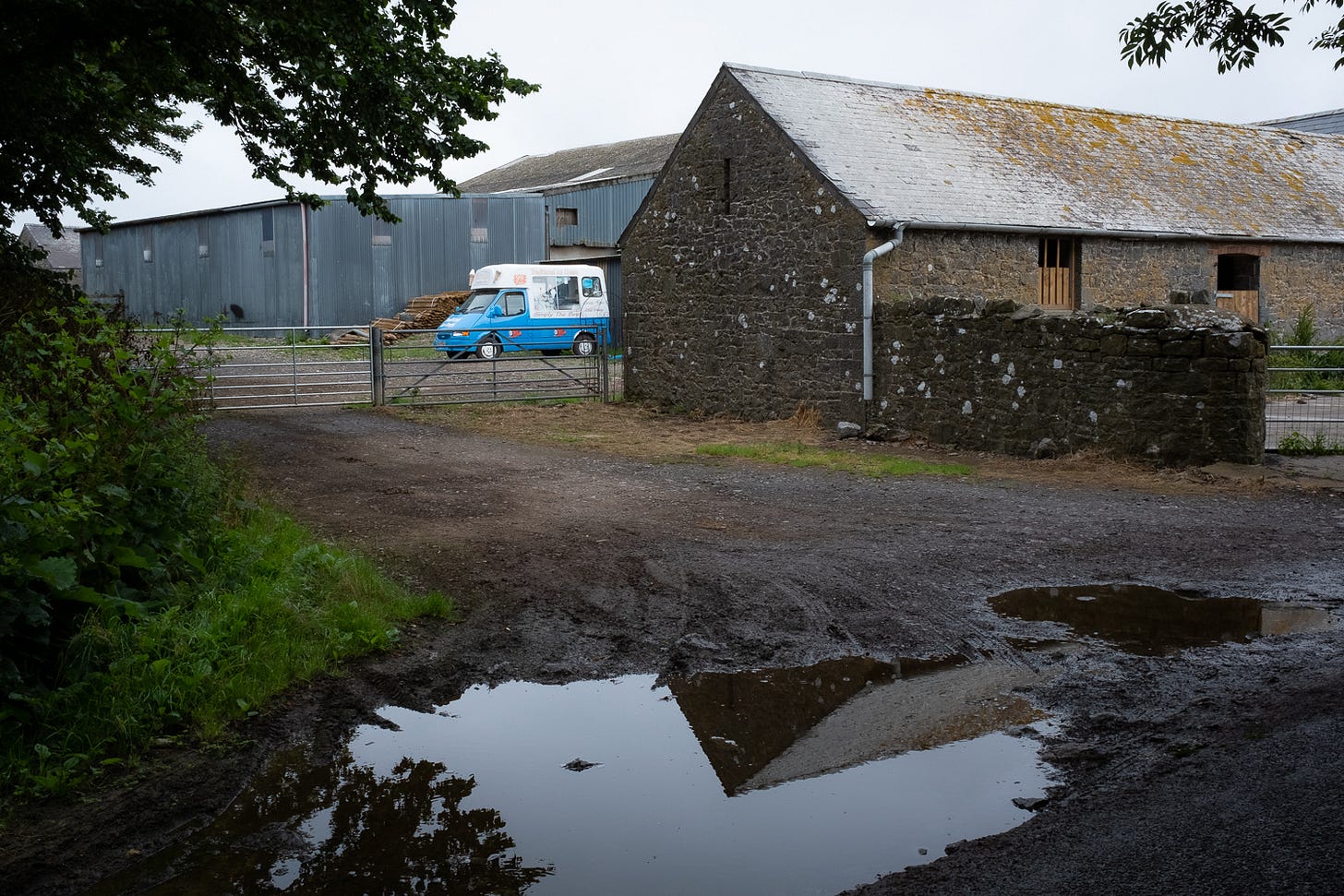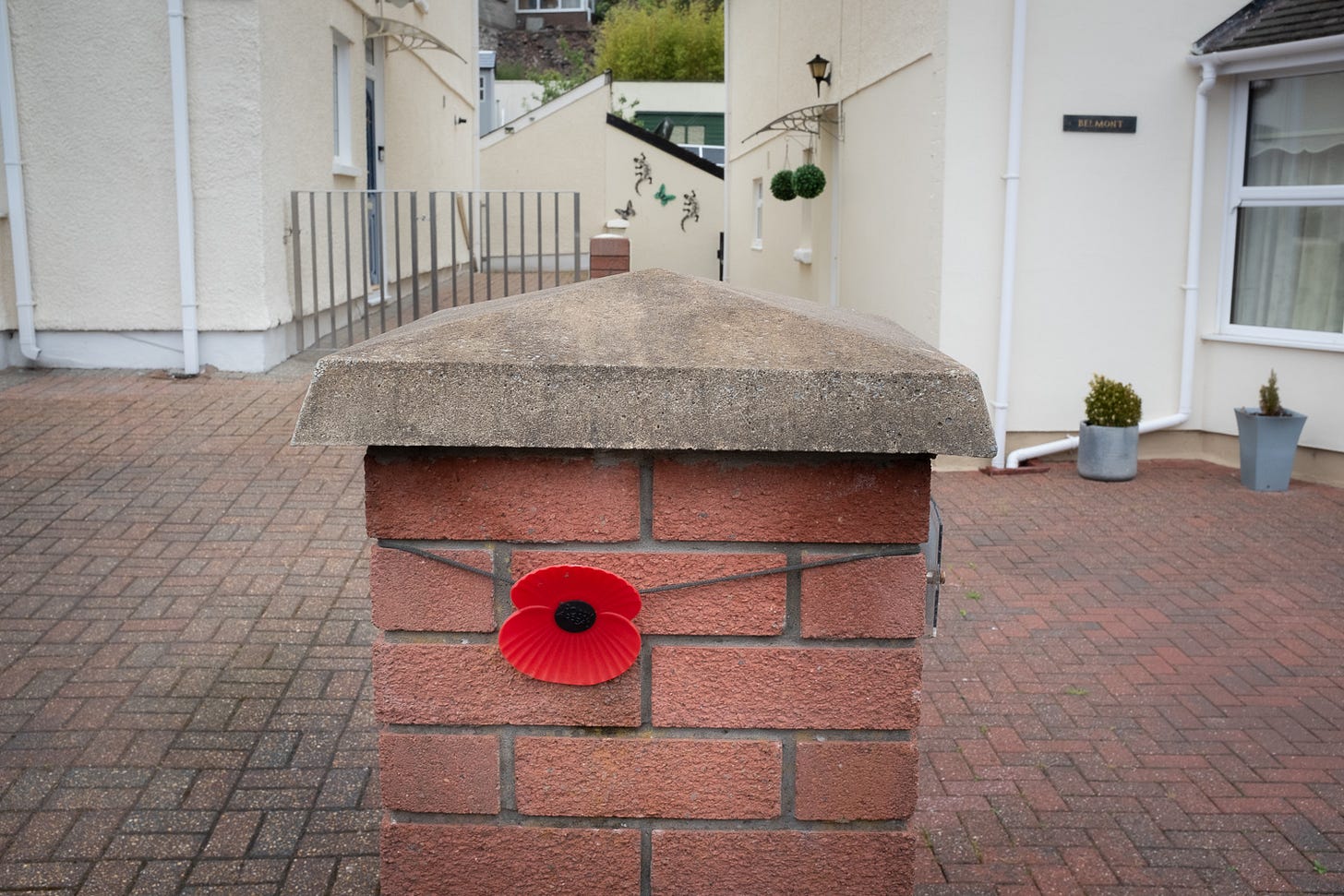There were no cars driving out of Bosherton. The road was a tiny canyon that burrowed between the hedgerows. Only the postman passed with a flash of red that pressed me into the verge. Then the road was quiet again. A fine rain kept falling and there was a distant chatter of rifle fire.
I walked a few miles until the lane dissected a bend on a wide road. There were cars on this one. I dumped my soggy backpack on the grass, momentarily relieved, and fished out a crushed flapjack for breakfast. Flecks of rain appeared on my whiteboard like ball bearings. It wasn’t a great place to hitchhike from, the inside of bends on fast roads rarely are, but I was lucky, a black Mercedes S-class flew around the corner looking like it might take off. I stepped back as it soared by, but its break lights blared and within a moment it was stationary. I leapt in.
The driver was in combats. Grey, brown, green leaves covered his arms above perfectly folded sleeves. His hair was blonde, with repressed curls cropped tight to his head, shaved above the ears. He pressed a firm handshake and introduced himself as Ben. He was in the second cavalry regiment.
The car surged forward. Whitby was seven hours away and Ben wasn’t hanging around. He wanted to see his girlfriend. He’d been three weeks on exercise and the promise of a weekend off beckoned sweetly.
“How was it?” I asked, thinking of the gunshots I’d heard from the coastline.
“Yeah it was all right,” he shrugged. He was a straight-up kind of guy, serious and upright, born and raised in Yorkshire, “Hard work and tiring.”
Ben was a gunner. He described how a tank has four crew members. The driver is the lowest rank, usually the newest member too. Then there’s the gunner and loader who were of similar rank. The commander was often an officer but not always.
“Going on exercise is pretty intense,” he explained, “You’re in there from 6:30 in the morning to 12 at night. Then you pitch a tent against the side and sleep there too.” They lived off ration packs and whatever snacks they could take with them. Ben’s favourite rat pack meals were the Full English or chicken and pasta but he thought they were all pretty good, better than the food in camp at least. That was all boiled, even the meat. It was disgusting.
The camping and the rat packs I thought I could get used to but it was the intensity of the relationships that must be the hardest to navigate. Living in such close quarters can't be easy. Ben agreed but shrugged again: “Everyone’s sound. You don’t get any dickheads.” It made sense. Sometimes you did get dickheads apparently but they met one of two outcomes: they didn’t last, or they’d stop being a dickhead. “Sometimes you get commanders who try and show a bit of authority, but generally you get along with people.” I could believe it.
It was the people that Ben liked most about the army. Friendships are welded like iron in environments like that. Now those kinds of exercises are fun because he’s with his best mates all day. Literally. He also loved how the job took him around the world. Canada was his favourite trip. They’d go there on regular exercises though he couldn’t remember where exactly. It was somewhere in the prairies and was a huge open expanse of bogland. He said it was the size of Reading and there was only one tree that stood right in the middle and was surrounded by fences to stop people driving into it. They do 40 days in the tank there, then they’d have a few weeks to travel. Ben would go skiing or snowboarding and he’d been down to the States a few times too.
He went to Eastern Europe a lot as well though that was less fun. They had to spend six months in Estonia every couple of years. You couldn’t leave the camp and you weren’t even allowed to drink. Rishi Sunak came out to meet them on their last trip: “Yeah he was all right,” he said, “He was tiny. Only came up to my nose.” He’d been wearing Timberlands apparently.
“You don’t mind if I smoke do you?” Ben asked, as he cracked the window an inch. The Pembrokeshire air rushed through noisily as he tossed the box back between the seats and took a long draw. The smoke was dry and distinctive.
He told me how they’d spent the last trip out there trying to flog our old Scimitar II tanks. “They were shit they were,” Ben shook his head with a hint of a smile, “Wouldn’t want to go to war in one of them.” They were hot too. On exercise in Canada, Ben was sitting right next to the engine. He was in nothing but his body armour. Even his trousers were pulled down to his ankles. He drank six litres of water a day and would still only piss once. They were told to gas the tanks up to the Latvians though, make them sound great. They did a good job; they bought them.
Ben normally drives Warriors or Challenger IIs. The latter had been in the news since we’d sent a few to Ukraine and Ben was excited to see how they’d perform. They have a 120mm tank gun and a top speed of 60km an hour, can fire accurately up to 7km and they’ve got a controller like an Xbox’s but wider. There’s an eyehole with a laser for aiming. A Challenger II had never been destroyed in combat before.
“Well, not in active combat,” he qualified, “At Castlemartin a few years ago one got done. It was blue on blue during night firing. Shot by another tank it were. And another one a few years later got done but that was the crew. They misloaded and the recoil protection wasn’t on properly so it blasted back into the tank and killed all three of them.”
It sounded like a grim way to go but there wasn’t a hint of worry in his voice. Neither was there when he told me about firing a Javelin anti-tank missile recently. Just a single shot costs the army £100,000. “That was epic,” he recalled, clearly unfazed by firing something essentially designed to kill him and his crew. Normally they fire things at old Land Rovers and shipping containers. He said it was cool seeing them flip double in the air in clouds of fire and smoke.
I asked what he thought of the war in Ukraine. He’d been following closely and often videos would be circulated of specific tank manoeuvres and things like that. Ben wanted to go out there. The thought of Russian phosphorescent bombs hitting schools and hospitals made his blood run fast. All those war crimes. Sometimes Ben felt like his training wasn’t being used for much besides endless exercises. The war offered a reason for it all.
In reality though, it was unlikely he’d go. You can’t just go AWOL, you have to have left the army for a year. “A mate of sergeant’s went out to fight,” he told me, “But he was killed. That was sad that were.” They knew some Estonians who’d gone too but all eight had died in a car crash. They hadn’t even reached Ukraine.
The weather got worse and the windscreen wipers battled hard. South Wales was nothing but low grey cloud. Ben said I could come as far as I like with him but I settled on Merthyr Tydfil as a good spot. I could go north from there and looking at the weather map there seemed to be a break in the dark blue blanket that lay heavy the rest of the county.
I realised Ben and I were about the same age. He’d done seven years in the army. So had his twin brother who was in the infantry - he was going to propose to his missus next month at the F1. Ben wasn’t sure he or his brother would stay in the army much longer. Everything was beginning to get repetitive and he didn’t fancy doing another 6-month stint in Estonia. He was considering going onto the oil rigs. He knew a man who could get him a job and the money was much better. It wouldn’t be so different from the tanks either.
We were soon at Merthyr Tydfil. The junction I’d found turned out to be a huge building site. Enormous diggers and lorries shifted huge piles of mud. The traffic was hellish, waved frantically this way and that by men in orange suits. The whole road was dug up and all of it was mud in the rain. We found a cul-de-sac where I could get out.
“Agh,” I moaned, “Can’t believe I forget my waterproof…” The forecast said rain all weekend and it was only Friday morning.
“Oh I’ve got one,” Ben said, “It’s brand new. 100% waterproof. Have it, I’ll get a new one at camp.” He rooted around in the back and tugged out a camouflage raincoat, tossing it over.
He got back in the car and pulled back into the traffic. I shook on the coat and climbed up the hill.
Thank you for sticking with me through 60 chapters! I can’t quite believe it. I hope you’re still enjoying it and if so please share with someone you think would too. There are plenty more stories to tell…!





